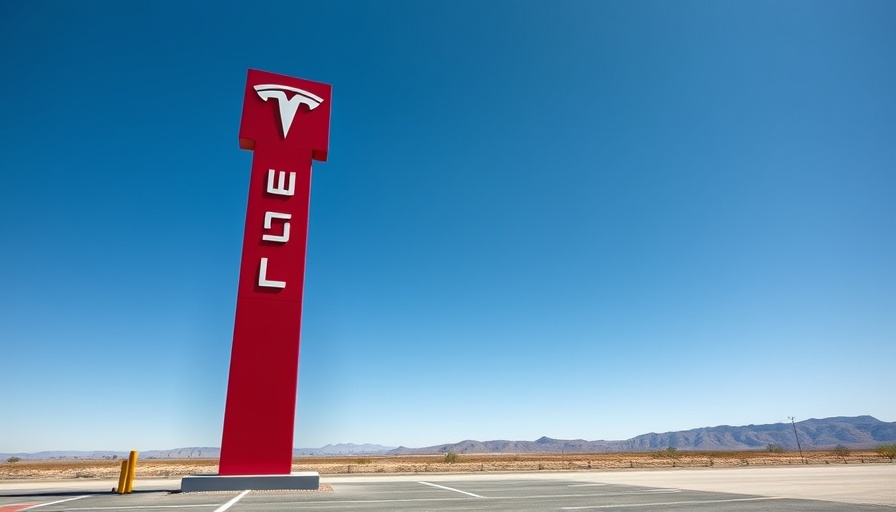
An Unexpected Shift: Tesla's Advertising Strategy
Tesla’s advertising expenditures on X, previously called Twitter, have sunk to a remarkably low level. Just a few years ago, the company was averse to spending on conventional advertising. CEO Elon Musk’s insistence on forgoing advertisements changed only after shareholder pressures mounted in 2023. As a result, the automaker began a timid foray into advertising within the digital realm, with efforts reported on platforms like Google and YouTube. However, recent reports indicate a drastic reduction in their ad spending for 2025, raising questions about the effectiveness and longevity of this strategy.
Declining Spend: What the Numbers Reveal
Remarkably, Tesla spent $400,000 on advertising in 2024 but has drastically reduced this figure to what is projected to be as little as $60,000 for 2025. Within the first two months of this year, their spend was limited to only $10,000— a stark contrast to $200,000 spent during the same period last year. This decline begs the question: Is Tesla losing its relevance in the market? The company has yet to respond to inquiries regarding how their advertising approach may evolve going forward, leaving industry experts concerned.
The Tesla Approach to Marketing: A Unique History
Tesla’s history with marketing is unconventional. The company’s success has largely stemmed from a grassroots level of customer advocacy and innovation rather than reliance on standard advertising strategies. Musk’s background in tech and his anticipated projects gave Tesla a cult-like status among fans and tech enthusiasts. The apparent shift to advertising only occurred after mounting inquiries from shareholders indicating that the lack of formal advertising could hamper revenue growth.
The Ripple Effects: Implications for Elon's Ecosystem
Beyond advertising, details in the recent filings reveal other significant financial dynamics within Musk’s enterprises. Tesla paid SpaceX about $800,000 for using its private jets, a cost that has also seen reductions, indicating a notable shift in spending priorities. The implications of these financial decisions are significant; with declining ad finances and reduced spending on logistics, it signals tightening budgets that affect operational capacity across Musk’s ventures.
Cost of Security: A Growing Concern
Notably, Tesla allocated $2.8 million in 2024 to Musk's security firm, emphasizing the escalating costs associated with safety amid Musk's high-profile status. As these expenditures rise, questions arise about the financial vigor of Tesla’s strategy, particularly when juxtaposed against its declining ad budget.
What This Means for the Future of Advertising
The debate surrounding Tesla's advertising approach mirrors a broader trend in the tech industry where companies reassess their marketing strategies amid changing market demands. As more businesses pivot to digital strategies and carefully curated campaigns, Tesla’s reduced spend opens a dialogue on the effectiveness of traditional advertising in the era of social media-driven marketing.
Expert Opinions: A Balanced Perspective
Many marketing analysts speculate about the risks of abandoning traditional advertising altogether. Is the lack of ads indicative of short-term strategies intended to temporarily cut costs? Some experts argue that while grassroots marketing can be successful, companies like Tesla may need to find new ways to maintain visibility in an increasingly competitive landscape.
Looking Ahead: Predictions and Opportunities
As 2025 progresses, following trends in advertising, particularly in high-tech industries, will be critical. Will Tesla reinvigorate its marketing approach or stay on its current trajectory, risking diminished market presence? Future trends may steer the company towards more innovative and integrated branding strategies that blend traditional ads with Elon Musk's unique public persona. The outcomes of these decisions could ripple throughout the broader tech industry.
Conclusion: The Need for Strategic Re-evaluation
This evolving narrative about Tesla's ad spending and its broader implications highlights the necessity for strategic re-evaluation in the marketing landscape. It serves not only as a case study for Tesla but for all tech companies navigating the complexities and changes of modern marketing paradigms. Businesses must stay adaptable, considering multiple perspectives, lest they fall behind in an ever-evolving marketplace.
 Add Row
Add Row  Add
Add 



Write A Comment